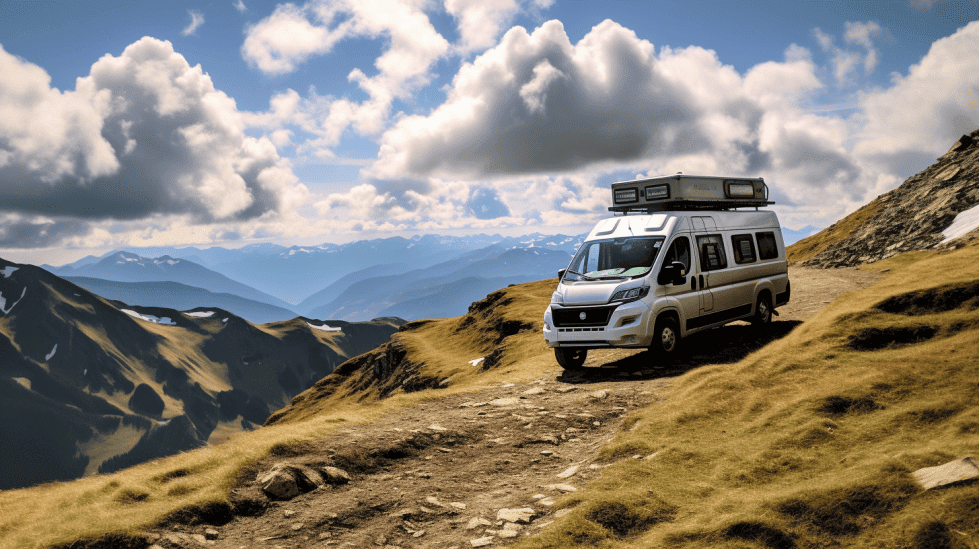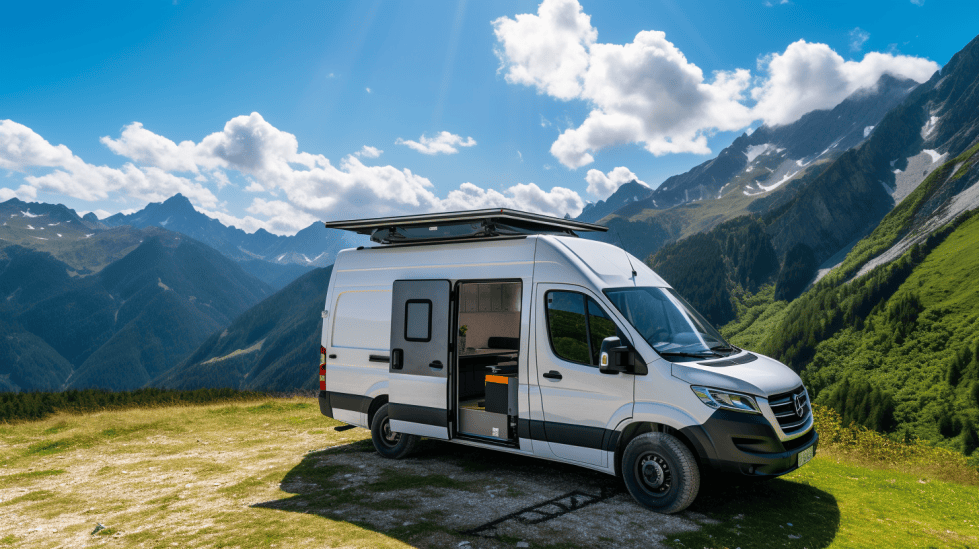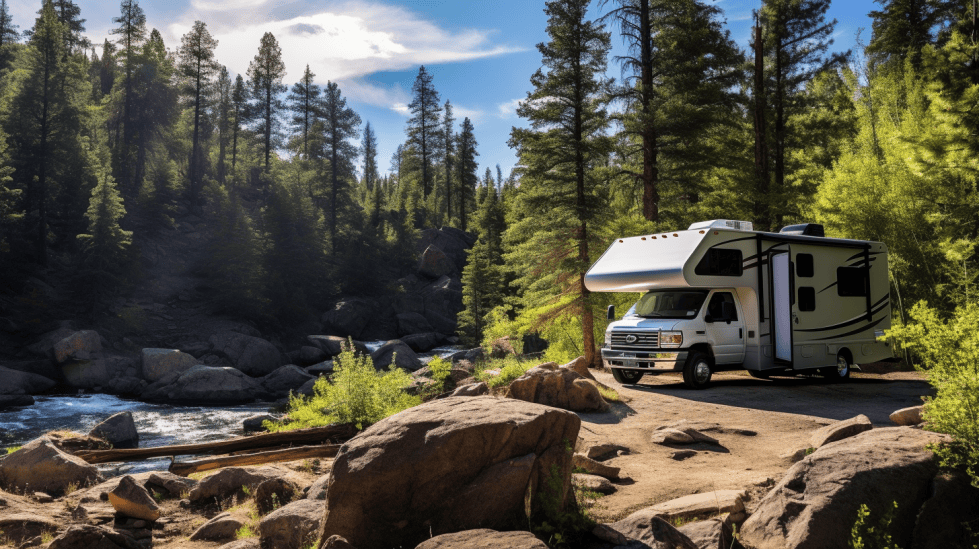Best RV for Off-Grid
As an RV enthusiast, I’m always on the lookout for the best rigs that cater to off-grid living. Off-grid RVing has become increasingly popular in recent years, allowing adventurers to escape the constraints of traditional campgrounds and experience the true beauty of nature. The ideal off-grid RV should have essential features such as suitable power sources, efficient water and waste management systems, as well as ample comfort and storage space to support this liberating lifestyle.
Selecting the perfect RV for off-grid living can be a daunting task, as there are various factors to consider. It’s important to understand the key features and aspects of an off-grid RV before committing to a purchase. To help with this, I’ve gathered information on top RV options that suit the off-grid lifestyle, and will discuss essential elements such as power sources, and maintaining comfort and storage during off-grid escapades.
Key Takeaways
- Off-grid RVs should have reliable power sources, efficient water management, and ample storage space.
- It’s crucial to understand the unique features of off-grid RVs to make an informed decision.
- Top options for off-grid RVs cater to various budgets, lifestyles, and preferences.
Understanding Off-Grid RVing
As an avid RVer, I’ve become quite familiar with off-grid RVing. Off-grid living is about being self-reliant and independent, which means relying on your own resources for power, water, and waste management when camping in remote areas. Off-grid camping, also known as boondocking, involves staying in remote locations or places without access to traditional campground amenities like electricity, water hookups, or sewer connections.
One key aspect of off-grid RVing is to have a well-equipped RV that can handle the challenges of remote areas. This might include having solar panels for energy generation, onboard water tanks for potable water, and efficient waste management systems. It’s also critical to be conscious of conserving resources while off-grid, as replenishing them might not be as easy compared to staying at a campground.
In my experience, planning is crucial for a successful off-grid adventure. This entails selecting appropriate remote locations that are suitable for your particular RV, as well as having backup plans in case the initial destination is not accessible. Moreover, ensuring that your RV is in good working order and conducting regular maintenance checks is essential in preventing any unexpected issues.
It’s vital to be aware of local laws and regulations regarding off-grid camping. Some remote areas may require permits while others may impose restrictions on the length of stay. Always respect the environment and practice Leave No Trace principles when camping in remote places, as this ensures that these locations remain pristine for future generations of RVers to enjoy.
As someone who has tried RVing off the grid, I can say that it’s truly a unique and enriching experience. Being able to explore stunning remote locations while enjoying the comforts and convenience of my RV is something I cherish. Though it might require some additional effort and preparation compared to traditional RV camping, I believe that off-grid camping offers a sense of freedom and adventure that makes it well worth the experience.
What is an Off-Grid RV?
An off-grid RV is an RV specifically designed to allow its inhabitants to live comfortably without depending on external resources such as electricity, water, or waste disposal. These specialized RVs offer valuable amenities to sustain your adventure no matter where you roam, and I’ve spent time researching the top off-road RVs, off-road campers, off-grid trailers, and off-grid travel trailers to provide some key insight on the best off-grid options out there.
When looking for the best RV for off-grid living, I focus on factors like solar power, battery storage, water storage capacity, and waste management systems. A prime example of a well-rounded RV with off-grid capabilities is the Winnebago View, which features 200-watts of solar, group 31 batteries, and ample holding tank capacity for extended stays away from traditional camping facilities.
Off-road campers are designed for traversing rough terrain and accessing remote locations. They often feature reinforced structures and off-road friendly suspensions. In the off-road camper category, I’ve found that the EarthRoamer XV-LTS has become a popular choice, thanks to its heavy-duty chassis, self-contained off-grid capabilities, and luxurious interior.
Off-grid trailers and off-grid travel trailers come in various sizes and configurations, fitting the needs and preferences of different travelers. From compact and lightweight teardrop trailers to larger options with more interior space, there are many choices to suit your off-grid lifestyle. Some of the best off-grid travel trailers I’ve come across include the Black Series HQ19 and Airstream Basecamp, both providing ample storage, solar power options, and rugged construction for extended stays in remote locations.
In conclusion, an off-grid RV should be equipped to handle your adventures, whether you’re planning an off-road expedition or embracing a full-time, sustainable lifestyle. The best off-grid options I’ve discussed offer a combination of power, water, and waste management capacity, allowing you to truly embrace the freedom of off-grid living.
Features to Look for in Off-Grid RV

When I’m searching for the perfect off-grid RV, there are a few key features that I prioritize. These features not only enhance the experience, but also ensure that my RV is well-equipped for various terrains and situations.
First, I look for a RV with four-wheel drive capability. This is crucial for navigating off-road terrains and maintaining control on uneven surfaces. Along with four-wheel drive, terrain tires or off-road tires are essential for a smooth and secure ride on uneven grounds. These tires are designed to provide optimum grip and traction, making it easier to traverse various off-road conditions.
Another feature I consider important is the ground clearance of the RV. Greater ground clearance ensures that the vehicle can easily pass over rocks, debris, and uneven surfaces without any damage to the undercarriage. Additionally, I focus on the independent suspension system in the RV, which allows each wheel to move independently. This, in turn, offers better comfort and handling while driving on rough terrains.
Lastly, I take note of the standard features that come with an off-grid RV. These may include solar panels, a sturdy and robust chassis, ample storage options, and quality appliances. Having a well-rounded RV with a combination of these standard features makes living off-grid more feasible and enjoyable.
In conclusion, by considering features such as four-wheel drive, terrain tires, off-road tires, ground clearance, independent suspension, and standard features, I can confidently choose an off-grid RV that suits my needs and adventures.
Water and Waste Management for Off-Grid RVing
When it comes to off-grid RV living, one of the major considerations is water and waste management. I’ve dived into several aspects of managing the water and waste systems effectively while being off the grid.
Firstly, having a freshwater tank is essential as it allows me to carry clean drinking water throughout my trip. A fresh water storage tank can be installed either internally or externally, depending on the size and layout of the RV. It’s important to ensure it’s made of food-grade material and has a suitable size to meet my water needs.
Next, I need to address heating the water for showering and washing purposes. A suitable water heater comes in handy, enabling me to enjoy hot water on demand. These heaters can run on propane, solar, or electricity, depending on my preferences and available resources.
Now, let’s talk about wastewater. Most RVs have separate tanks for black water (sewer) and grey water (sink and shower). Black water tanks store waste from the toilet, and grey water tanks store waste from sinks and showers. Regularly emptying and maintaining these tanks ensures a hygienic living condition and prevents any undesirable odors.
However, an alternative and eco-friendly waste management option is a composting toilet. It’s a great choice for off-grid RVing as it converts human waste into nutrient-rich soil, reducing the need for a black water tank and simplifying waste disposal.
For those who prefer a simpler toilet option, a portable toilet can be a good solution, provided that it’s properly disposed of in designated areas. Portable toilets are compact, lightweight, and easy to use, making them convenient for off-grid adventures.
Overall, it takes a careful consideration and planning to ensure an effective water and waste management system for off-grid RVing. By choosing the right components and maintaining them regularly, I can confidently enjoy off-grid living while staying clean and hygienic.
Top RV Options for Off-Grid Lifestyle
I can confidently say that living off-grid is an enticing experience, and finding the perfect RV to accommodate the outdoor adventure is crucial. There are many options available, and here, I present some of the top choices for comfortable, functional, and memorable off-grid adventures.
As a fan of camper vans, I appreciate the Winnebago Revel for its off-road capabilities and compact design. Built on a 4×4 Mercedes-Benz Sprinter chassis, it provides both versatility and reliability. With features like a solar power system, wet bath, and galley, the Revel is perfect for those looking for a minimalist and rugged off-grid experience. For more details, you can check this website.
When considering the best travel trailers for off-grid living, it’s hard to overlook the Black Series HQ and Bruder EXP-6. Their heavy-duty, off-road design, combined with luxury interiors, make them an excellent choice for exploring the wilderness without sacrificing convenience. The Black Series HQ offers a full galley kitchen, while the Bruder EXP-6 comes with a large living space and bunk beds perfect for families. Click here for a more comprehensive list of the best RVs for off-grid living.
For those interested in lightweight travel trailers, the Winnebago Hike and Airstream Basecamp are great options. These trailers are easy to tow and come equipped with essential amenities for a comfortable off-grid lifestyle. The Winnebago Hike features a modern interior with versatile outdoor gear storage, while the Airstream Basecamp focuses on blending compact design and functionality, making it a solid choice for solo travelers or couples. Take a look for a more in-depth description and comparison.
Lastly, small travel trailers like the Taxa Mantis Trailer are a top pick for those preferring simplicity and easy towing. The Mantis Trailer offers a sleek design, ample storage, and a convertible bed, making it a minimalist’s dream.
With its intelligent use of space and lightweight construction, this trailer is perfect for quick getaways or longer off-grid adventures. Discover more about this remarkable trailer here.
In conclusion, choosing the best off-grid RV is dependent on personal preferences and the desired level of comfort. Whether you prefer a rugged camper van, a luxury off-road camping trailer, or a lightweight travel trailer, there are numerous appealing options to explore the great outdoors and embrace the off-grid lifestyle.
Powering Off-Grid RVs
When it comes to powering off-grid RVs, there are several options available to ensure a comfortable and convenient experience for those who love the freedom of being off the grid. One of the most popular and efficient methods is using solar energy.
I’ve found that a good solar power system for an RV usually consists of solar panels, a charge controller, an RV battery, and an inverter. The solar panels collect sunlight and convert it into DC electricity, which then gets regulated by the charge controller, ensuring the RV battery receives the proper charging voltage and prevents overcharging.
Lithium batteries are an excellent choice for off-grid RVs due to their lightweight design, high energy density, and long life span. They can store a greater amount of energy in a smaller space compared to traditional lead-acid batteries, making them ideal for those with limited space in their RVs.
When selecting a solar panel kit, it’s essential to consider the power output of the panels and how much energy your RV will need. As a general rule of thumb, you can calculate your daily energy consumption and choose a solar panel kit that provides enough wattage to cover your requirements.
Portable solar panels are a useful addition to a solar power system as they can be easily set up and adjusted to catch the most sunlight. These panels can be a great source of backup energy if the roof-mounted panels don’t produce enough power on cloudy days or when parked in a shaded area.
Solar generators are another valuable component in an off-grid RV setup. These portable power stations can store energy from solar panels or other sources and provide electricity when needed. They are particularly useful for those who require additional power for appliances or devices.
When designing my off-grid RV electrical system, I always take safety and efficiency into account. It’s vital to ensure that the charge controller, inverter, and other components are compatible with one another and installed correctly to avoid potential damage or hazards.
An efficiently designed solar energy setup for RVs can vastly improve off-grid living adventures and provide campers with the independence and flexibility they desire. With a well-thought-out solar system in place, I can enjoy the serenity of being off the grid without worrying about my power needs.
Comfort and Storage in Off-Grid RVs
When living off-grid in an RV, comfort and storage are two essential factors I always consider. A well-equipped RV should provide the necessary amenities and space to make the experience enjoyable and efficient.
In terms of comfort, having a reliable air conditioner is crucial for maintaining a comfortable temperature inside the RV. Air conditioning not only helps me stay cool during hot summer days but also helps to regulate humidity levels, ensuring a pleasant living environment. A well-designed living area with a cozy seating arrangement and ample space for relaxation is equally vital.
The kitchen area in an off-grid RV is another crucial aspect I look for. A full kitchen equipped with modern appliances such as a refrigerator, stove, and oven allows me to prepare delicious meals while out in the wilderness. Moreover, outdoor kitchens are a great addition for those fond of cooking in open spaces while enjoying nature.
Sleeping arrangements play a vital role in the overall comfort of an RV. For instance, having a queen bed is a great choice, as it provides ample space for a restful night’s sleep. Having comfortable sleeping quarters is essential for rejuvenating and providing the energy needed to explore the great outdoors.
Storage is also an essential feature to consider. Plenty of storage space is crucial to carry all the necessary gear, food supplies, and personal belongings. I always ensure that the RV includes well-designed cabinets, shelves, and closets to accommodate all my belongings without cluttering the living space.
In conclusion, choosing the right off-grid RV with proper comfort and storage features ensures a pleasant and hassle-free outdoor living experience. By prioritizing air conditioning, living and kitchen areas, sleeping quarters, and ample storage space, I know that my off-grid RV adventures will be both comfortable and organized.
Frequently Asked Questions
What are the top RV models for off-grid living?
In my experience, some of the best RV models for off-grid living are the Airstream Classic, Living Vehicle Core, and EarthRoamer XV-LTS. These RVs are designed with self-sufficiency in mind and come equipped with features that make off-grid living more comfortable and enjoyable. For instance, they have large battery banks, solar panels, and water storage systems as mentioned in this article.
Which RVs have the best off-road capabilities?
From what I’ve seen, some of the RVs with impressive off-road capabilities include the EarthRoamer XV-LTS, Conqueror UEV-490, and Black Series HQ19. These models are engineered to tackle rough terrain and have reinforced chassis, off-road tires, and advanced suspension systems to handle challenging conditions. The Drive’s article provides more information on preparing an RV for off-grid living.
What are the most affordable off-grid RV options?
If you’re looking for an affordable option, consider smaller travel trailers like the Airstream Basecamp, Forest River No Boundaries, or the Braxton Creek Bushwhacker Plus. These models prioritize essential off-grid features while keeping costs more manageable. For a more in-depth look at RVs for off-grid living, you may want to check out this list.
Are there off-grid RVs with full bathrooms?
Yes, many off-grid RVs come equipped with full bathrooms, including a shower, toilet, and sink. Examples of such models include the Living Vehicle Core, Airstream Classic, and EarthRoamer XV-LTS, all of which feature well-designed bathrooms that maximize space and functionality.
What is the optimal size for a Boondocking RV?
The optimal size for a boondocking RV depends on your personal preferences and needs. Some people prefer smaller, more maneuverable RVs, like teardrop trailers or pop-up campers, which are easier to tow and park. Others may desire larger RVs with more living space and amenities. When determining the best size for your off-grid adventures, consider factors such as storage, the number of occupants, and your desired living standards.
How do travel trailers compare to fifth wheels for off-grid living?
Travel trailers and fifth wheels both have their pros and cons when it comes to off-grid living. Travel trailers are generally lighter, more affordable, and easier to tow than fifth wheels, making them a popular choice for those on a budget. However, fifth wheels provide more living space and often come with additional features that make off-grid living more comfortable, such as larger fresh water tanks and more powerful solar systems. The decision between the two ultimately comes down to your personal preferences, budget, and towing capability.









